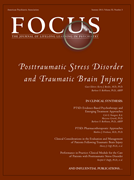PTSD: Evidence-Based Psychotherapy and Emerging Treatment Approaches
Abstract
Posttraumatic stress disorder (PTSD) is estimated to affect 6.8% of Americans and 13%−20% of U.S. military personnel deployed to Iraq or Afghanistan. Societal impacts include psychiatric and physical comorbidities, which lead to work impairment and increasing health care costs. While treating PTSD with pharmacotherapy has accumulated some empirical support, the Institute of Medicine rates trauma-focused cognitive behavioral therapy as the only first-level treatment for PTSD. This paper explores the evidence for trauma-focused psychotherapy options including exposure therapy, cognitive processing therapy, eye-movement desensitization and reprocessing, and stress inoculation training. Emerging treatment innovations are examined, including medication-enhanced psychotherapy, virtual reality exposure therapy, psychotherapy delivered via telemedicine, and complementary and alternative medicine-based therapies. Implications and Future Directions: Various forms of trauma-focused cognitive behavioral therapy appear to be equally efficacious. Because many patients fail to respond to these treatments, however, more research on the efficacy of alternative treatment approaches is necessary. While there is already emerging evidence for other forms of psychotherapy and alternative methods for delivering psychotherapy, rigorous studies of complementary and alternative medicine approaches are severely lacking. Research demonstrating efficacy for these different treatment options could make treatment more acceptable, tolerable, and available.



